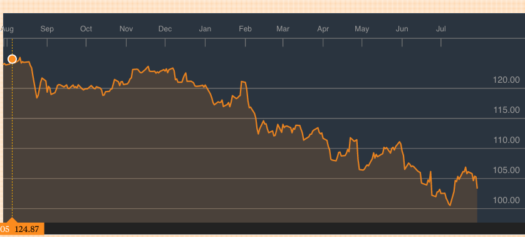During the first several years of Abenomics, the BOJ actively pushed monetary stimulus. Their announcements were often more aggressive than expected, and the yen depreciated sharply on this news. The inflation rate rose from negative territory up close to the 2% target. This year, however, the BOJ seems to have given up on monetary stimulus. Most of the recent announcements have been less aggressive than the markets expected, and the yen has appreciated from a low of about 125 to the dollar, to 105 as of yesterday. Today the BOJ produced another disappointing announcement, much less than markets expected, and the yen plunged another 3%, to 102. This is not rocket science, If the BOJ allows a strong yen they will fail to hit their target. If they do enough stimulus to dramatically weaken the yen, they can hit their target. So why don’t they?
This also shows why we cannot rely on policy discretion. Policymakers simply are not willing to carry out their instructions. A CPI or NGDP futures targeting regime (level targeting) would solve the “problem”. Which is probably why it won’t be adopted.
Why did the BOJ allow this to happen?
 PS. It’s amazing how similar Abenomics is to FDR’s policies. You have highly successful monetary stimulus which is abandoned for no good reason. You have a weird mixture of fiscal stimulus and austerity. And you have the government putting the cart before the horse, by trying to pressure firms to raise wages:
PS. It’s amazing how similar Abenomics is to FDR’s policies. You have highly successful monetary stimulus which is abandoned for no good reason. You have a weird mixture of fiscal stimulus and austerity. And you have the government putting the cart before the horse, by trying to pressure firms to raise wages:
Openly pushing companies to raise wages is just one of the unorthodox economic policies attempted under the Abe government to jump-start an economy that seems stuck in a long-term rut.
I wish they’d go back to trying to raise NGDP, that’s the only durable way to get higher wages.